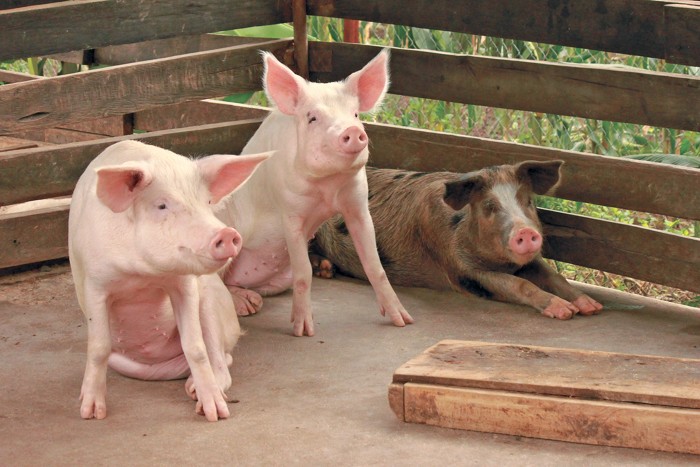Advertisement
Grab your lab coat. Let's get started
Welcome!
Welcome!
Create an account below to get 6 C&EN articles per month, receive newsletters and more - all free.
It seems this is your first time logging in online. Please enter the following information to continue.
As an ACS member you automatically get access to this site. All we need is few more details to create your reading experience.
Not you? Sign in with a different account.
Not you? Sign in with a different account.
ERROR 1
ERROR 1
ERROR 2
ERROR 2
ERROR 2
ERROR 2
ERROR 2
Password and Confirm password must match.
If you have an ACS member number, please enter it here so we can link this account to your membership. (optional)
ERROR 2
ACS values your privacy. By submitting your information, you are gaining access to C&EN and subscribing to our weekly newsletter. We use the information you provide to make your reading experience better, and we will never sell your data to third party members.
Vaccines
Merck and J&J Ebola vaccines deployed in Ivory Coast outbreak
The vaccines have quelled Ebola outbreaks in other parts of Africa
by Megha Satyanarayana
August 19, 2021

Ebola vaccines made by Merck & Co. and Johnson & Johnson are being used in the Ivory Coast to try and squelch an outbreak of the often deadly virus.
Jean-Marie Yameogo, a public health specialist who is the World Health Organization representative in Ivory Coast, says the Merck vaccine is being given to direct and secondary contacts of the first confirmed case—a person who traveled to Abidjan, the economic capital of Ivory Coast. The person traveled while ill and was hospitalized almost immediately upon arriving at their final destination in Abidjan. They tested positive for the hemorrhagic virus.
The outbreak was declared Sunday, Aug. 15, and vaccines were deployed soon after.
Contacts include family, neighbors, and health-care workers with whom the person interacted at a private clinic and then a hospital. People whose contact status was unclear also requested vaccinations.
The J&J vaccine will be given to people who were not in the area of immediate transmission of the virus—for example, people who rode the bus with the infected person, Yameogo says.
The effort in Ivory Coast is the latest in a vaccine strategy that has quelled outbreaks in Guinea and the Democratic Republic of the Congo. People understand the risk of Ebola, Yameogo says, and have lined up of their own accord at vaccination sites in the city. Two days after the campaign started, he says, more than 1,000 people have been inoculated.
Yameogo says he expects the outbreak, which was declared once the traveler’s case was confirmed, will be quickly contained. “We know that if we initiate the vaccination earlier, we will shorten the outbreak,” he says. “It’s really different now, for WHO and the entire world, with the existing Ebola vaccines.”
The Merck product, called Ervebo, is a single-dose vaccine made of a weakened vesicular stomatitis virus engineered to carry the Zaire ebolavirus’s glycoprotein on its surface. Ervebo is used in what’s called a ring vaccination strategy. People who have been exposed to someone who has Ebola are vaccinated, and people who have been exposed to those vaccinated people are themselves vaccinated.
J&J’s vaccine is a two-dose regimen called Zabdeno and Mvabea. Zabdeno is an adenovirus displaying the glycoprotein, and Mvabea is a Vaccinia virus that carries immune targets for Zaire ebolavirus, as well as other viruses in the Ebola family that cause disease.
The US Food and Drug Administration approved Ervebo in December 2019. The European Medicines Agency approved the J&J combo in July 2020 and Ervebo in November 2019. Merck is also seeking approvals from health authorities in several African countries affected by the virus. The company inked an agreement with UNICEF in January to create a stockpile of Ervebo.
Both companies’ vaccines need to be stored cold, and Yameogo describes the effort to get some 5,000 doses into Ivory Coast from neighboring Guinea, where they had been used in that country’s most recent outbreak.
Workers from UNICEF and WHO packed the vaccines into small deep-freeze boxes, put them on a private plane, and sent them off to Abidjan. Once the vaccines arrived, they were taken to sites around the city and moved into cold storage. Also on the plane were five experienced vaccine administrators from Guinea, brought to Ivory Coast to train local health-care workers to dispense the vaccines.
Ivory Coast is experiencing its first Ebola infection since 1994, when a scientist studying the virus accidentally got infected. Yameogo says WHO’s main concern is the country’s shared border with Guinea, where there are multiple unofficial crossings. The organization is working with the governments of both countries to trace contacts of the infected person.





Join the conversation
Contact the reporter
Submit a Letter to the Editor for publication
Engage with us on Twitter